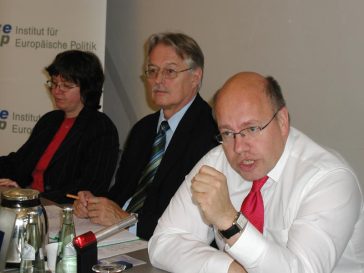IEP Lunch Debate with Peter ALTMAIER: “The Internal Security of the EU: Current Developments and Perspectives”

The European Union today can only reduce the “dissatisfaction of citizens toward Europe” through a demonstration of its capacity to act. State Secretary Altmaier, from 2002 to 2003 a deputy member at the EU constitutional convention and previously at the EU fundamental rights convention, presented this thesis at the beginning of his talk for this IEP Lunch Debate. Peter Altmaier, MdB, Parliamentary State Secretary in the German Federal Ministry of the Interior, stated that, for too long, the debate has primarily been about institutional questions, when in fact the very dynamic area of justice and home affairs policy offers an ideal field in which to correspond to citizens’ wishes for security and freedom through noticeable progress. There is thus a good chance to demonstrate the “advantages of European cooperation” with concrete projects.
In the 1970s there was still no direct cooperation between German and French police or border authorities. Today the member states can report great successes in the improvement of internal security through direct, cross-border cooperation, especially since the European summit of Tampere in 1999. As an example, Altmaier identified the upcoming football World Cup in Germany. For the first time, police officers from almost all member states will serve at stadiums and other events in their respective national uniforms alongside German units. Moreover, one of the greatest accomplishments remains the European Arrest Warrant, whose ratification, however, is regrettably not yet complete in Germany due to a decision of the Federal Constitutional Court.
The EU member states are currently confronted with three cross-border threats: international terrorism, cross-border crime (especially drug trafficking) and illegal immigration. Altmaier emphasised that European citizens expect effective protection from the EU in all of these problem areas. The EU thus finds itself with the difficult task of dealing with the requirement for internal security in the member states without conveying the impression of a “fortress Europe” by strengthening the Schengen area. For this reason, the goal of an effective neighbourhood policy is closely connected with the expansion of the European area of freedom, security and justice.
Altmaier showed himself rather noncommittal on additional legislative proposals in the area of justice and home affairs. The quick ratification and practical implementation of the already agreed legal arrangements should come to the fore. In this context, he referred to the concrete form of the Treaty of Prüm, signed in May 2005, on the deepening of cross-border cooperation for the fight against international terrorism, crime and illegal immigration, which is supposed to be adopted into community law as soon as possible. It is a great success that agreements for simplifying the deportation of illegal immigrants have meanwhile become no longer bilateral, but are instead negotiated by the European Commission directly with third countries.
The expansion of the Schengen area to the new member states is now necessary, says Altmaier. There must be country-specific evaluations, which would most probably lead to a phased accession to the Schengen Agreement. Altmaier welcomed possibilities for “cooperation renforcée“ in the area of justice and home affairs between those states that actually demonstrate a common interest on certain projects and want to proceed. This need not and should not be limited to the large G‑6, but the group should remain open for all that want to join and can join.
To conclude, Altmaier explained that the Interior Ministry is currently working intensively on its program for the German Council Presidency in the first semester of 2007. Given the elections in France and the Netherlands in 2007, one should expect only a “Road Map” for future progress on the European Constitutional Treaty and not a complete resolution to the crisis. Finally, the question of internal security in the “modern” and not just the repressive sense will definitely be a priority of the German Presidency.
By: Gesa‑S. Kuhle

